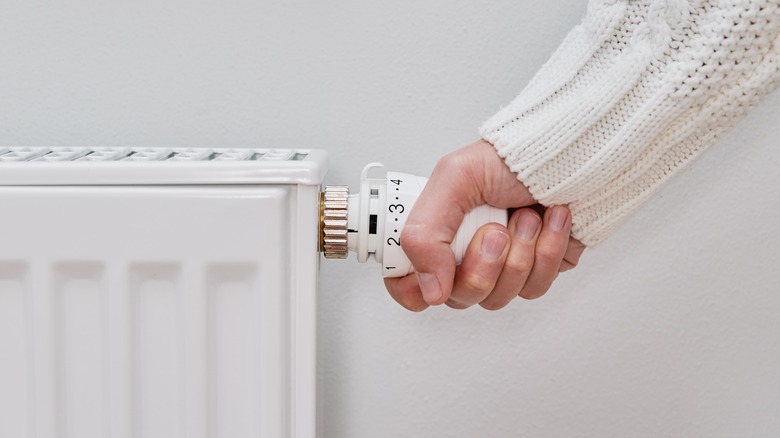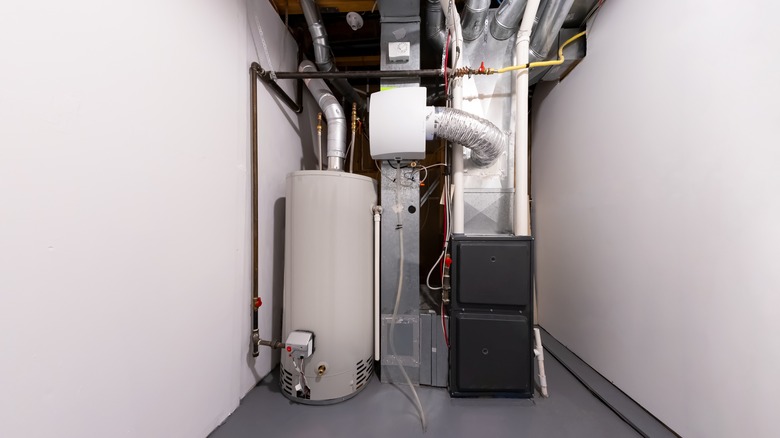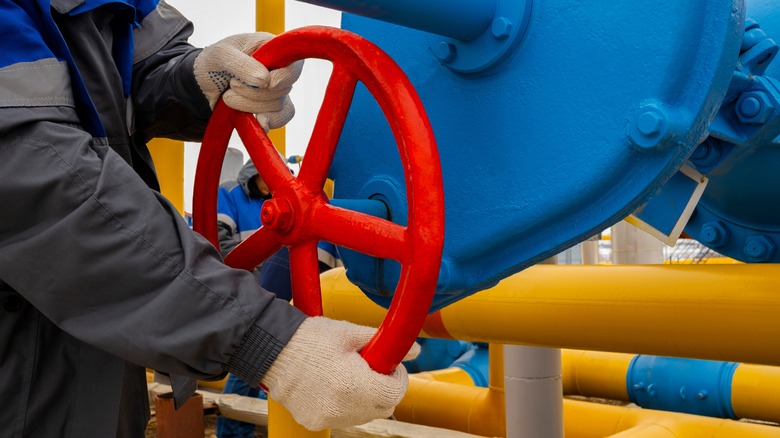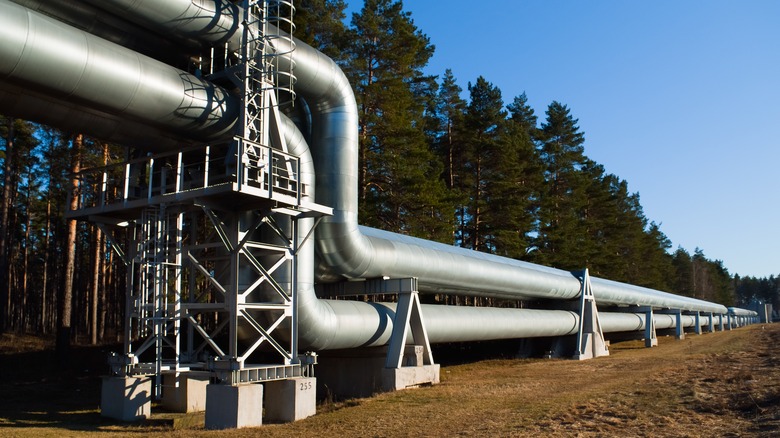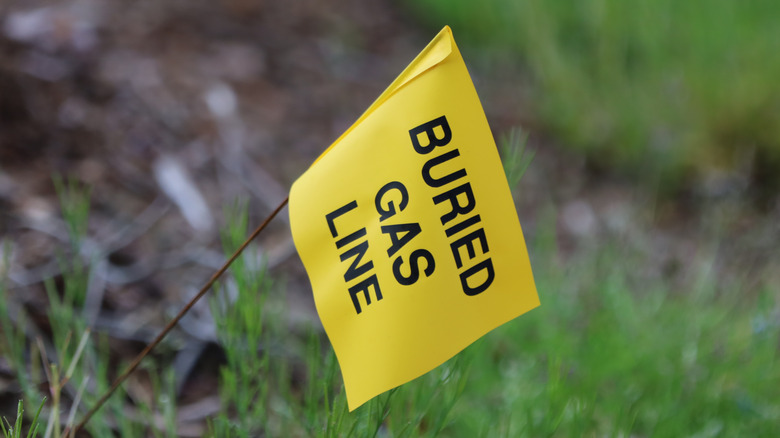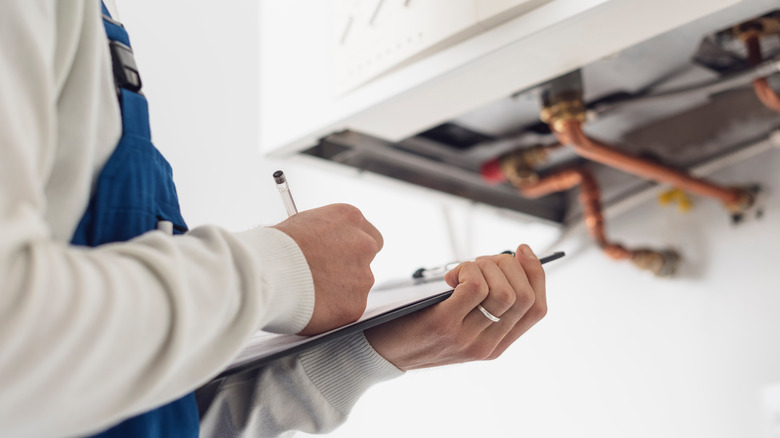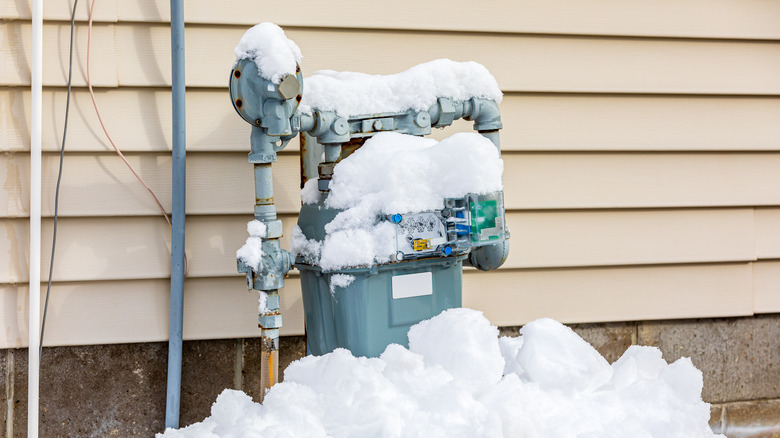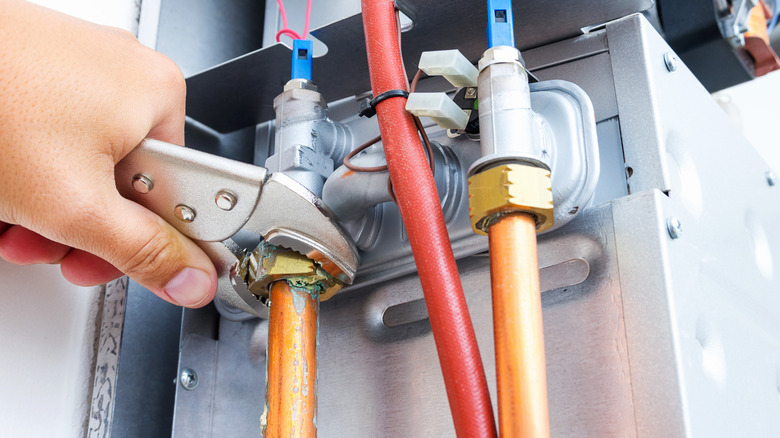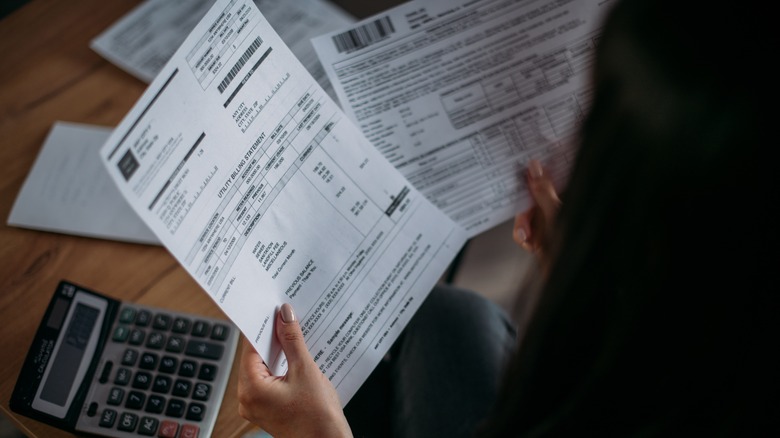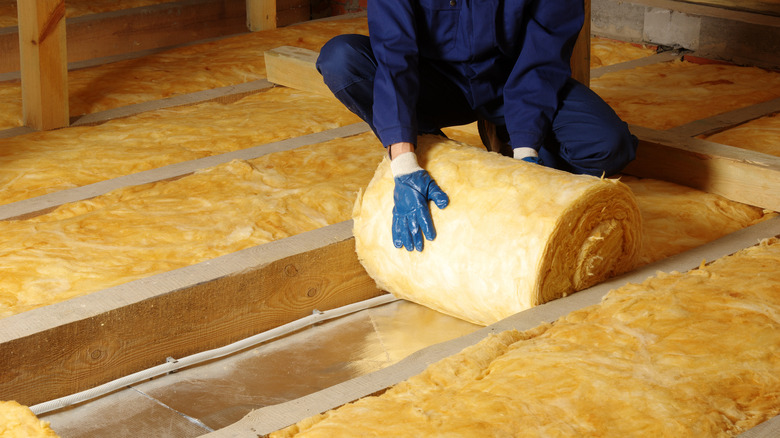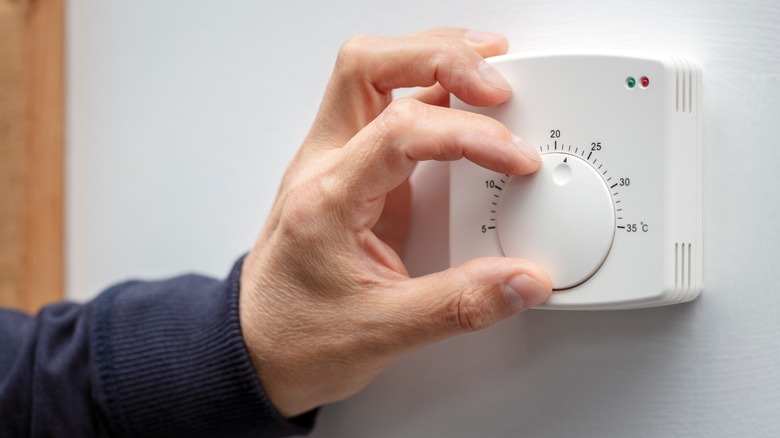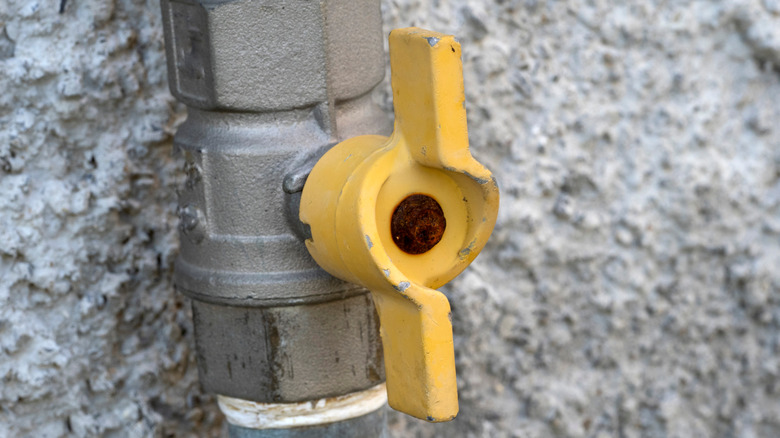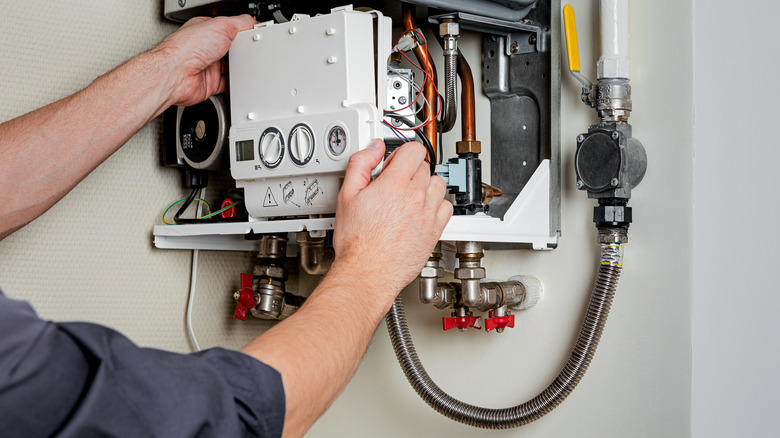What You Should Know About Gas Heating Before Buying A House
When the mercury begins to drop, we rely on home heating systems to keep us comfortable and warm. Several residential heating systems exist, including forced-air furnaces, boilers, and radiant heating systems. If you're buying a new house, you'll likely come across one of these heating system types. What do they all have in common? They can all run on gas.
Gas heating systems use natural gas as an energy source to create heat. Nearly half of all U.S. homes use natural gas for heating, according to a 2021 survey by the U.S. Census Bureau. This popularity means potential home buyers will likely view a house with gas heating at some point during their house hunt. Safe, affordable, and reliable, there's good reason for the ubiquity of gas heating, but there are also some drawbacks. Read on to see what important factors to keep in mind when considering a home with gas heating.
Common types of gas heating systems
To start with the basics, there are several types of home heating systems that can use natural gas. According to Forbes, there are four common types. Furnace systems, commonly called forced-air furnace systems, heat air and then distribute the warm air through a ducted system that spans throughout the house. Most North American homes are heated with a central furnace, according to the EIA, with a large portion of those being natural gas furnaces.
The second type is a boiler system, also known as boiler and radiator systems, which heat water to create transferable heat. The hot water (or the steam, in the case of a steam boiler) is then pumped through pipes and radiators throughout the home. The third is a baseboard heater system, which also uses a boiler to heat water, but instead of pumping the hot water through radiators, it pumps it through baseboard heaters. Lastly, radiant heating works similarly to boiler heating, using a boiler to heat water. The hot water then circulates through tubing (usually plastic) placed underneath the floor, and sometimes even behind walls and ceilings.
It's important to consider the benefits and drawbacks of the particular heating type, as well as the considerations of natural gas home heating in general. Keep in mind that these heating system types can also use other power sources like electricity or propane.
Gas heating is economical, reliable, and more eco-friendly
Gas heating is popular for good reason; it's relatively affordable, reliable, and fairly eco-friendly compared to other fossil fuels. Gas heating systems can sometimes be pricier upfront, but often have lower monthly bills, as per the American Gas Association. A 2020 report from the EIA shows that natural gas is generally more affordable than other heating sources, like electric or propane.
Natural gas heating is generally reliable since many areas are serviced by it. Unlike oil or propane, natural gas is pumped directly to supplied homes, so there is always a gas source (barring any major issues). Some gas heating systems will even work when the power goes out, which means those heating systems can switch on even when the lights can't.
According to the EIA, natural gas burns cleaner than other fossil fuels, creating less air pollution compared to burning coal or petroleum products. While it's still a non-renewable fuel source (so it's not the most sustainable option), eco-conscious home buyers can find solace in choosing a cleaner fossil fuel.
There are some drawbacks of gas heating
While gas heating is more eco-conscious than coal or propane, it's not the most sustainable option out there. Natural gas is still a non-renewable resource, mostly consists of methane, and is considered a fossil fuel. The processes of obtaining and transporting natural gas can result in some gas escaping, which contributes to greenhouse gas emissions. In fact, in 2019, the EPA estimated that leaked natural gas made up around 4% of the U.S. total greenhouse gas emissions (via the EIA).
While natural gas burns cleaner than other fossil fuel sources, gas heating is less sustainable than some other options. According to the Pew Charitable Trusts, there are efforts in some states to ban new natural gas connections in an attempt to shift away from fossil fuel use. This is because some climate advocates believe the path to carbon-neutral heating is electric, citing electric heating systems powered by renewable energy as more sustainable (via CBC).
Lastly, Constellation Energy Resources notes that while natural gas heating is safe overall, it has some dangers. A natural gas leak can be hazardous and may result in an explosion, fire, illness, or injury. Homeowners need to pay attention to the safety precautions of gas heating systems.
A natural gas line is required
Natural gas lines transport gas across the country and pump it directly to homes for heating and cooking. If you're hoping to install a gas heating system in a new home, check if it has a natural gas line. If a gas line isn't present, a new service line will need to be installed. Keep in mind that not all areas in the U.S. are serviced by natural gas. A local utility authority or local natural gas companies can help determine if you can get natural gas to your new home.
Natural gas service lines are often made of steel or plastic and are buried underground, according to the Pipeline Safety Trust. On any property with natural gas lines, it's important to avoid accidentally puncturing this underground system. According to Call 811, before any digging project, which includes anything from planting a new tree to installing fence posts, homeowners must "call before you dig."
811 is the U.S. national call-before-you-dig line. This service can give the approximate location of underground utility lines, like natural gas lines, to avoid any mishaps. Because of this, the location of natural gas lines can affect future renovation projects, which is a factor to consider when buying a new home. Make sure to map out the location of gas and other utility lines before planning a big renovation.
Maintenance is a must
Regular maintenance helps keep gas heating systems safe and efficient. Constellation Energy Resources recommends a gas safety check once a year. Due to the hazardous nature of natural gas, it's best to hire a professional to service a gas heating system. Natural gas is flammable, combustible, and can cause natural gas poisoning — in short, not a substance you want to mess around with. A certified gas technician from a reputable company can make sure maintenance is done safely and correctly.
The U.S. Department of Energy outlines some maintenance steps that heating system professionals should go through. This list includes checking and testing the condition of the heating system, ensuring no natural gas or carbon monoxide leakage, and cleaning dirt, soot, or corrosion from the system. These steps ensure the heating system is safe. Making sure the heating system is clean and in working order can also improve the efficiency and longevity of the furnace or boiler.
There are a few maintenance steps you can do yourself
While serious tinkering is best handled by professionals, there are some steps you can take to keep a gas heating system safe and in good shape. To start, FortisBC recommends keeping the area around the gas heating appliance clear. It's especially important to make sure flammable and combustible items are not stored near gas-heating appliances.
Keeping areas clean and clear also applies to the gas meter and gas lines. Items should not be tied to or leaned onto gas meters or lines. The gas meter is usually located outdoors and should be easily accessible in case of an emergency. Occasional maintenance may be needed to keep the area easy to reach. For example, making sure plants and weeds don't become overgrown in the area.
Cold weather brings the possibility of snow and ice, which can affect gas meters and pipes. Keep gas meters clear of heavy snow and ice, but do so gently. It's best to clear the snow and ice by hand. While it's tempting, don't hit a meter to break down snow or ice. If there is significant ice build-up, call a local utility authority for advice.
Consider how long gas heating systems last
The age of appliances is a factor to consider when house shopping, and this includes the age of the heating system. Most gas heating systems use furnaces or boilers to create heat to distribute through air vents, radiators, baseboard heater systems, or radiant heating systems. Both furnaces and boilers have an average life expectancy of 15 to 30 years, as per the U.S. Department of Energy. As long as you keep up with your annual maintenance checkups, they can last towards the longer end of the curve (via Service Champions Heating & Air Conditioning).
As is the case with most appliances, keeping up with maintenance can help with longevity. A gas heating appliance that lasts for 15 to 20 years is comparable to heat pumps, active solar heating, and electric resistance heaters, which also have a life expectancy of 15 or 20 years. Some gas furnaces and boilers last much longer, but homeowners may consider a replacement sooner to upgrade to more efficient models.
Ask about the gas system's age and maintenance history
If the furnace or boiler is over 10 years old, it will likely need replacing in the next decade. A new replacement furnace or boiler is not a small cost, running around $4,500 for a replacement furnace, according to HVAC.com. Energy Star recommends replacing furnaces or boilers over 15 years old, so keep this timeline in mind when buying a new home.
It's also prudent to ask the current homeowners for a maintenance history of the gas heating system. A recent service will give you peace of mind that the heating system is safe and working. A history of annual service shows the heating system has been well-maintained. Al Bourgeois Plumbing & Heating recommends taking it a step further and also checking for proof of existing gas service. A document like a recent gas bill shows proof that the gas was recently turned on and that the gas service line is working properly.
Ongoing costs of gas heating
Expected costs of a gas heating system include the natural gas bill and the cost of annual maintenance services. The gas bill will vary depending on the climate, home size, and the heating system efficiency. Usage habits and home weatherization can have an impact on energy bills, so that's where to focus your efforts to save, according to The New York Times. Natural gas prices can also fluctuate, affecting the cost of home heating.
While gas heating systems are generally reliable, breakdowns do happen. According to Consumer Reports, a fourth of furnaces are expected to wear down by their tenth year. To fix the heating system, you'll likely need the help of a professional, which means a repair bill. While you're more likely to be in the majority that doesn't need repairs in the first decade, it doesn't hurt to budget for the possibility. In terms of long-term costs, the furnace or boiler will need to eventually be replaced, likely after the 10-year mark.
Weatherizing and retrofitting can help reduce costs
Just like with any home heating system, weatherizing your home can reduce gas usage and cut down the monthly gas bill. Weatherizing a home can result in significant savings. According to the U.S. Department of Energy, for every dollar invested in insulating your home, you get an average of $0.90 to $1.40 back in energy savings. Best of all, some simple weatherizing steps are very simple. Common weatherizing measures include air sealing your home using caulk or weatherstripping, installing window film, and ensuring adequate ventilation (via the U.S. Department of Energy). You can invest more in weatherizing by adding insulation, correcting moisture problems, and investing in smart systems for better climate control.
Older furnace and boiler systems can sometimes be retrofitted to improve efficiency. A heating professional can install retrofits like vent dampers, intermittent ignition devices, and derating gas burners (via the U.S. Department of Energy). Keep in mind that if the appliance is at the end of its service life, replacing it with a new, more efficient model might be better.
How safe is gas heating?
Gas heating is safe, as shown by the millions of gas heating systems in homes nationwide. However, a few precautions and safety factors must be considered. Natural gas is flammable, combustible, and can cause adverse health effects. Natural gas appliances can also create carbon monoxide, a colorless and odorless gas that can cause carbon monoxide poisoning, as per the British Columbia Office of the Fire Commissioner. Safety in a home with gas heating involves avoiding and recognizing natural gas and carbon monoxide leaks.
Naturally, natural gas is colorless and odorless. To improve safety, gas providers add a chemical to natural gas to make it smell like rotten eggs. This sulfurous smell makes it easier to detect a natural gas leak at home. Natural gas alarms are also available; these are a great warning system, especially important for those with a diminished sense of smell.
Carbon monoxide is also colorless and odorless and can be created when natural gas does not burn properly. Regular gas heating maintenance reduces the chance of gas furnaces and boilers producing carbon monoxide. Since carbon monoxide is virtually undetectable to humans and can cause serious health effects (and even death), carbon monoxide alarms are a must in homes with gas heating. Columbia Gas of Ohio recommends a carbon monoxide detector on each home floor and bedroom.
Make sure everyone in the household knows what to do if there is a gas leak
The ubiquity of gas heating means everyone should know how to recognize a gas leak and how to keep safe. If you live in a home with natural gas appliances, all household members need to know the signs of a gas leak. Telltale signs of a natural gas leak include the sudden smell of rotten eggs, the hissing sound of gas leaking, or a natural gas alarm going off. Carbon monoxide is a sneakier danger, so we rely on carbon monoxide alarms to tell us when this hazardous gas is present.
If you suspect a gas leak, there are a few important steps to take, according to the American Gas Association. First, the building should be evacuated (or the general area, if the gas leak is outdoors). Second, take steps to avoid causing any type of spark, which can cause the gas to combust. This means the obvious causes of sparks, like not using a lighter or matches, but also less obvious dangers, like using electricity in general. Do not switch on or off appliances, lights, telephones, or other electronics near the gas leak. Once evacuated, call 911 or the local gas utility emergency number. Utility workers or emergency responders can help shut off the gas and identify the severity of the situation. Do not enter the area again until emergency responders say it is safe.
Know where the gas supply shutoff is located
For most suspected gas leaks, evacuate the building and call an emergency line for instruction; it's usually not necessary for you to shut off the main gas supply yourself. Shutting off the main gas supply should only be done in extraordinary emergencies, such as after a major natural disaster like a big earthquake, as per Puget Sound Energy.
The gas supply shutoff valve is usually located on the supply valves leading to the gas meter, outside the home. The outdoor location makes it easy to access in an emergency. Unlike most appliance shutoff valves, main gas supply valves can't be turned off by hand. According to Pacific Gas and Electric Company, you'll need a crescent wrench or other suitable tool. It's best to keep this tool in an easily accessible location so you can reach it in an emergency. To shut off the main gas supply, use the tool to turn the gas supply shutoff valve a quarter-turn. Once shut off, you should not attempt to turn the gas back on yourself. This job needs to be done by the gas utility company or a qualified professional.
Know when to call a professional for help
When it comes to gas home heating systems, some situations aren't an emergency but still warrant a call to a gas heating technician. Before settling into a home with gas heating, you should know some signs of possible heating problems, as per Total Home Supply. One of the first and most obvious signs that something is amiss is the lack of heat. Although gas heating systems make some sounds, odd noises are another sign of trouble. Heat damage or soot stains around a furnace or boiler can signal improper operation. If the furnace or boiler has a yellow, sooty, or unlit pilot light, this also shows the appliance isn't working as it should (via Better Health Channel).
Furnaces and boilers are complex systems, and it can be difficult (or even dangerous) for most homeowners to tackle gas heating problems on their own. In short, a call to a certified heating professional is in order if anything seems off or isn't working as usual. Fixing problems as they arise can help the gas heating system stay in working shape for longer.
